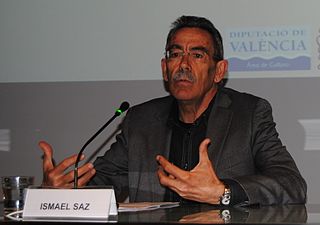
Alta Velocidad Española (AVE) is a high-speed rail service operated by Renfe, the Spanish State railway company.

The Technical University of Valencia, shortened to UPV, is a Spanish university located in Valencia, with a focus on science, technology, and arts. It was founded in 1968 as the Higher Polytechnic School of Valencia and became a university in 1971, but some of its schools are more than 100 years old.
There are 89 universities in Spain, most of which are supported by state funding. 39 Spanish universities are private, of which 7 are affiliated with the Catholic Church.

Hellín is a city and municipality of Spain located in the province of Albacete, Castilla–La Mancha. The municipality spans across a total area of 781.66 km2. As of 1 January 2020, it has a population of 30,200, which makes it the second largest municipality in the province. It belongs to the comarca of Campos de Hellín.

The Region of Murcia is an autonomous community of Spain located in the southeastern part of the Iberian Peninsula, on the Mediterranean coast. The region is 11,313 km2 (4,368 sq mi) in area and had a population of 1,511,251 as at the start of 2020. About a third of its population lives in the capital, Murcia, and a seventh in the second city, Cartagena. At 2,014 m (6,608 ft), the region's highest point is Los Obispos Peak in the Massif of Revolcadores.

The Free Culture Forum (FCForum) was an international meeting of relevant organisations and individuals involved in free culture, digital rights and access to knowledge. It took place in Barcelona every annually from 2009 to 2015, jointly with the oXcars, a free culture festival. The oXcars are a non-competitive awards ceremony held at Sala Apolo in Barcelona, Spain, in October each year. They are a public showcase that puts the spotlight on cultural creation and distribution carried out under the paradigms of shared culture. Through presentations and symbolic mentions of works in a series of categories, real legal situations involving free culture are shown using parody.

Lidó Rico is a Spanish expressive artist.

Javier de la Cueva, is a lawyer specialized in issues related to technology and the Internet. He graduated in Law and is Doctor in Philosophy from the Complutense University of Madrid. He has defended numerous cases involving the use of free licenses of intellectual property.

Alapont Group is a Spanish business group mainly dedicated to designing, manufacturing and installation of all types of engineering projects for lifting systems. Its headquarters are located in Alzira (Valencia). It also has offices in Madrid, Paris, Marseille, Toulouse, Alicante, Murcia, Castellón, Tarragona and distributors throughout the Spanish, French and Algerian territory.
Hyperloop UPV is a team of students from the Universitat Politècnica de València with the aim of designing Hyperloop, a proposed future means of transport. With renewable energies, the vehicle will levitate inside a vacuum tube, being able to reach 1,200 km/h (750 mph).
Makers UPV is a non-profit community of students from the Universitat Politècnica of València founded in April 2013, whose objective is to enhance the learning experience of students by adding a practical approach based on "experiential learning", Do it yourself and the Maker Culture. Through projects, competitions and workshops taught by the students with special abilities, the community is retrofitted and grows.
The Spanish Network of Excellence on Cybersecurity Research (RENIC), is a research initiative to promote cybersecurity interests in Spain.
The Spanish Bachelor's Degree in Law is the university academic degree conferred on those who have successfully completed a legal study process at a university. It is not the same as the Bachelor of Laws.

Ismael Saz Campos is a Spanish historian, specialised in the study of Falangism, Francoist Spain and the Spanish-Italian relations during the Spanish Civil War. He is a professor at the University of Valencia.

Advanced Wave Sensors (AWSensors) is a Spanish research and high technology company located in Valencia, Spain. The company develops, produces, and offers high-precision electronic detection instruments for basic research, preclinical research, and industrial applications. Created by a team of engineers from the Polytechnic University of Valencia (UPV), its highly sensitive sensors detect and weigh very thin layers of molecules, with a mass of less than nanograms.
In the run up to the 2015 Spanish local elections, various organisations carried out opinion polling to gauge voting intention in local entities in Spain. Results of such polls for municipalities in the Valencian Community are displayed in this article. The date range for these opinion polls is from the previous local elections, held on 22 May 2011, to the day the next elections were held, on 24 May 2015.

The Spanish Society of Academic Excellence is a Spanish society to promote and disseminate academic excellence and talent.











